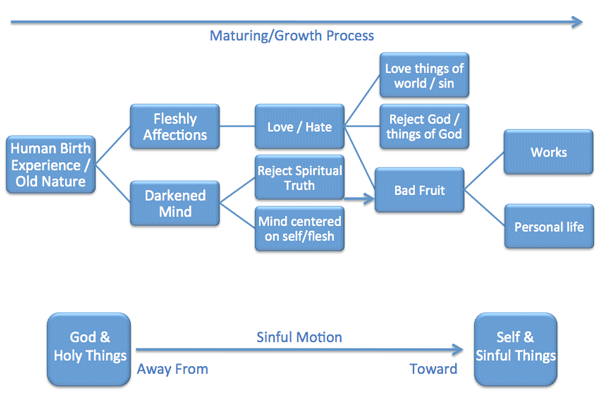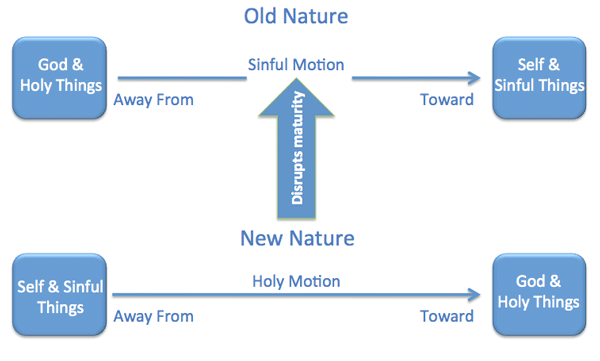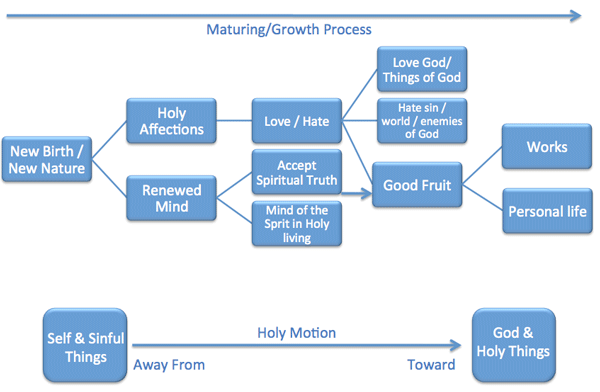COMPELLING TRUTH
Counterfeit Christians
Part 2: Bearing Fruit
By Robin Schumacher

But what exactly is that fruit, what causes it, and are there other characteristics of which the Bible speaks that sets believers apart from non-believers? How can a person reach the place of assurance that they truly belong to Christ?
How the Bible Describes the Non-Christian
The Bible says that every human being is born a sinner and a rebel where seeking God is concerned (cf. Psalm 51:5; Romans 3:11-18). That being true, each of us is born with a nature (called "the flesh" by the Bible in various places) that has ungodly affections and a mind darkened to the standards of God.The fleshly affections are chronicled by Paul in Galatians 5:19-21 and result in things that the unbeliever both loves and hates. The unbeliever loves the things of the world and rejects the things of God.
The unbeliever's mind is summed up by Paul in the following way: "For the mind set on the flesh is death... The mind set on the flesh is hostile toward God; for it does not subject itself to the law of God, for it is not even able to do so" (Romans 8:6-7). This equates to the rejection of spiritual truth and a mind that is self and world-centered rather than God-centered.
The "fruit" that is born from such a life is reflected in what a person does and who they truly are down deep. Left unchecked, there is continuous growth process and movement away from God—toward the self and sinful behavior.
All of this can be represented in the following way:

How the Bible Describes the Christian
When God saves a person, they are spiritually born again and given a new spiritual nature that disrupts the sinful maturation process described above. Therefore, the Christian life might look something like this:
Note that the new believer is not someone who never sins (cf. Romans 7), but they are now freed from being a slave to sin and are able to accept, embrace, and love the things of God.
The new Christian is given the gift of the Holy Spirit (2 Corinthians 1:22) who "testifies with our spirit that we are children of God" (Romans 8:16), which is the first indicator, and indeed a continuously occurring piece of internal evidence that a person is truly saved. Paul tells the Thessalonians that one way he knew they were saved was because "our gospel did not come to you in word only, but also in power and in the Holy Spirit and with full conviction" (1 Thessalonians 1:5).
The believer's new affections include a love for God, His Word, and His laws as defined in the Bible, and a hatred for the things that oppose God (cf. Psalm 119:97-113). The mind of the new Christian is one that now understands spiritual truth and is focused on the things of God, as Paul says: "For those who are according to the flesh set their minds on the things of the flesh, but those who are according to the Spirit, the things of the Spirit" (Romans 8:5).
The fruit that springs from the new life is radically different from the old nature and may best be summed up by 1 John 3:10: "By this the children of God and the children of the devil are obvious: anyone who does not practice righteousness is not of God, nor the one who does not love his brother."
These truths may be pictorially represented as follows:

The Chief Difference
In his magisterial work, A Treatise Concerning Religious Affections, Jonathan Edwards sums up the primary difference between those who have been truly saved and those who are not this way: "True religion, in great part, consists in holy affections." [1]In other words, the object(s) of a person's desires and affections vividly display either the presence or absence of God's Spirit in someone. Edwards says, "As from true divine love flow all Christian affections, so from a counterfeit love in like manner naturally flow other false affections. In both cases, love is the fountain, and the other affections are the streams." [2]
Edwards argues that the principal evidence of life is motion (a living person breathes, moves, etc.), and in like fashion, the primary evidence of a holy life is holy motion. [3] It is not about perfection, but a person's continuous direction that matters.
In part 3 of this series, I'll tackle some final questions on the topic of how you can ensure you possess true saving faith and discuss some practical methods everyone can utilize to confirm that one is not merely deluding himself into believing he is a Christian when, in fact, his is not.
[1] Jonathan Edwards, A Treatise Concerning Religious Affections, Kindle Edition, pg. 145.
[2] Ibid, 59.
[3] Ibid, 309-10.
Counterfeit Christians The Series
Part 1: Are you one? How do you know if you're born again?
Part 2: Bearing Fruit: The fruit that we bear shows if we really follow Jesus.
Part 3: U-Turn Christians: Those who leave Christ were never really with Him.
Image Credit: Magalie L'Abbe; "Untitled"; Creative Commons
comments powered by Disqus
Published 11-26-12

